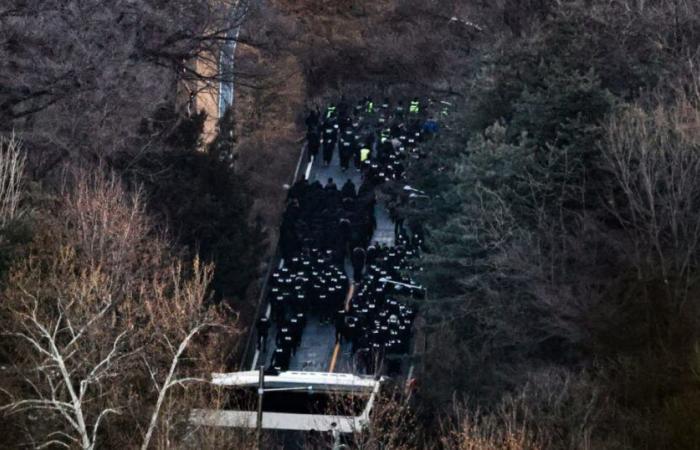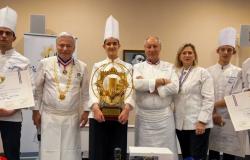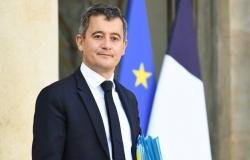The first raid on the residence where President Yoon Suk Yeol was holed up turned into a fiasco in early January. This Wednesday, agents from the Corruption Investigation Office (CIO) and the police showed up in numbers, before dawn, at the home transformed into a fortress in an upscale neighborhood of Seoul. After several hours, the team responsible for the operation said in a statement that they had “executed an arrest warrant against President Yoon Suk Yeol” at 10:33 a.m.
First sitting head of state arrested
“I have decided to respond to the Corruption Investigation Bureau,” Yoon Suk Yeol announced in a video message, adding that he did not recognize the legality of the investigation but was submitting to it “for avoid any unfortunate bloodshed.” But he remains silent in police custody where he must answer for his attempt to impose martial law in early December, investigators said. Suspended by deputies and wanted for “rebellion”, a crime punishable by death, the conservative leader had until then always refused to explain himself, pushing prosecutors to use arrest warrants in order to arrest him. force.
Never before has a sitting head of state been arrested in South Korea. Yoon Suk Yeol may be held in custody for 48 hours under the current warrant. Investigators will have to request a new one to possibly extend his detention. This is “the first step towards the return of constitutional order, democracy and the rule of law”, greeted Park Chan-dae, head of deputies of the Democratic Party (main opposition force) in Parliament.
Clashes during his arrest
Yoon Suk Yeol risks his post for having briefly introduced martial law on December 3, a shock measure reminiscent of the dark hours of the military dictatorship. He then justified it by his desire to protect the country from “North Korean communist forces” and to “eliminate elements hostile to the State”. In a Parliament surrounded by soldiers, the deputies had foiled his plans by voting on a text demanding the lifting of this state of exception. Put under pressure by elected officials, thousands of pro-democracy demonstrators and constrained by the Constitution, Yoon Suk Yeol had to comply.
On January 3, the Presidential Security Service (PSS), responsible for protecting heads of state, blocked the IOC's initial attempt to execute the first arrest warrant against Yoon Suk Yeol. For their second raid, prompted by a new arrest order, the authorities had warned that they would apprehend anyone who obstructed them. Brief altercations first broke out in front of the gate of the residence, where thousands of supporters were camped determined to defend the suspended president, some chanting “Illegal mandate! “.
Yoon Suk Yeol's future decided by mid-June
Teams from the IOC and the police then had to climb over the surrounding wall using ladders before getting past vehicle blockades inside the site. As they advanced toward the front door of the presidential home, police arrested the interim PSS chief, Yonhap news agency reported. Very unpopular, Yoon Suk Yeol was suspended on December 14 following the adoption by the National Assembly of an impeachment motion.
The day before his arrest, the Constitutional Court formally launched the trial to confirm or refute the sanctions of the deputies, with a very short first hearing. Yoon Suk Yeol did not show up, citing “concerns” about security. The procedure will continue even without him, with a second hearing scheduled for this Thursday. The court has until mid-June to decide the future of Yoon Suk Yeol, still officially the president pending the verdict. The court may either dismiss him definitively or reinstate him in his functions. If she chooses the first option, a new presidential election must be organized within 60 days.






